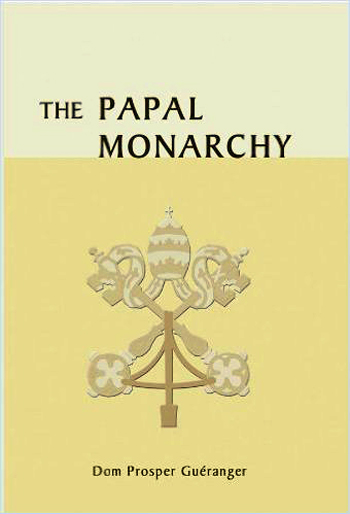Book reviews
 |
 |
 |
 |
 |
 |
 |
Papal Infallibility: Historic-Doctrinal Context
Book review of Papal Monarchy by Dom Prosper Guéranger, Fitzwilliam, NH: Loreto Publications, 2003, 307 pp.
Dom Prosper Guéranger wrote The Papal Monarchy to refute the 19th century re-emergence of the error of Gallicanism, a bad doctrine similar to Anglicanism that had infiltrated the ensemble of Bishops of France. Indeed, Gallia is the old Latin name for today’s France. From its beginnings, this movement refused to admit the authority of the Pope over the king's temporal dominion or the Pope's superiority to a general council. The revived Gallicanism affirmed that infallibility rested with the French Bishops.
This work constitutes a methodical and ample refutation of those who sought to undermine the Papacy and provides an affirmation of the doctrine of papal infallibility that would be decreed dogma shortly after its publication.
At the time, several Gallicans had produced works to deny the thesis of the dogma of the upcoming Vatican Council (known now as Vatican I). The Bishop de Sura, Henri Maret, published his Gallican opinions. Dom Guéranger wrote to refute him. Although the work is directed at arguments and persons that are long since dead, The Papal Monarchy is useful for us today because it defines a framework for the limits of bishops’ power and, perhaps more importantly for our times, provides the definitions and conditions of papal infallibility.
The setting
In 1870 Bishops from across the globe had gathered in a Rome besieged. The revolutionary forces of the Masonic Vittorio Emanuelle were preparing for their final attack on the Papal States, as the papal armies prepared for their last defense of the Sovereign Pontiff. It was in the shadow of this gathering storm that Pope Pius IX, in union with the Bishops of the world, was to pass a judgment on a doctrine that opposed all the secular machinations of the Revolution: Papal Infallibility.
Contradictions of Gallicanism
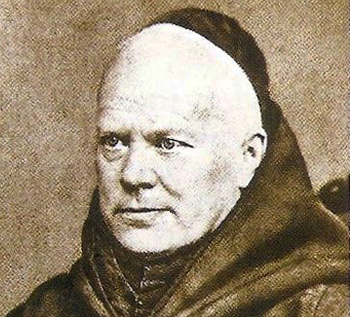 Dom Guéranger begins with an attack on Gallicanism. As a philosophy it was resurging not because of any inherent truth, but because of the fashionable politics of the 19th century that favored liberal democracy. As the Church is above nations and times, it is an error to believe that she must change to adapt to the moods of the world. Only revolutionaries were advocating a more democratic Church.
Dom Guéranger begins with an attack on Gallicanism. As a philosophy it was resurging not because of any inherent truth, but because of the fashionable politics of the 19th century that favored liberal democracy. As the Church is above nations and times, it is an error to believe that she must change to adapt to the moods of the world. Only revolutionaries were advocating a more democratic Church.
The Gallican position defended that the doctrine of the Church should be determined by ecumenical councils, but Guéranger attacks this system as imperiling the Church. He argues that a system of teaching that must await for the consent of a convention of bishops risks allowing serious errors to take root. Even if a council were to assemble every 10 years, the dangers of a potentially heretical doctrine seeping into the Church would be serious. The notion that dogma could be defined by the unanimity of bishops is equally unfeasible, as agreement between bishops is rarer than the councils that summon them.
Infallibility
Guéranger methodically demonstrates the precedent for Papal Infallibility, beginning with Scripture and working through Church tradition. Throughout History, papal anathemas have been treated as the word of God. When two councils failed to render a verdict on the doctrine of Pelagianism, a papal condemnation settled the matter. St. Augustine himself cited this as definitively ending the controversy: “Rome has spoken, the case is closed” - Roma locuta, causa finita est. It was always the Saints who were on the side of Papal Monarchy and the enemies of the Faith who were against it.
The author argues that if such pronouncements are fallible, then the Pope can err in his condemnation of doctrines and the foundation of Church dogma can be subject to error. Since it is by divine mandate that the gates of Hell shall not prevail against the Church, it follows that such pronouncements must be preserved from error by the Holy Ghost. To hold otherwise is to accuse Our Divine Lord of lying when He spoke those famous words to St. Peter giving him the keys of the kingdom of Heaven (Mt 16:18).
Bad History
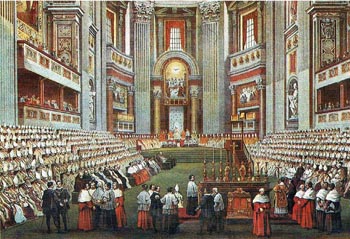 The author goes on to support his attack with extensive historical proofs. In 1497, Spanish theologian Pedro d'Orma was formally declared a heretic for promulgating doctrine that claimed the Pope could err. By reason the opposite stands true; the Pope possesses infallibility. Both St. Thomas Aquinas and Suarez favored papal infallibility. Several ancient councils had no force of law until they were later validated by Popes. As Guéranger demonstrates, the Fathers of the Church also supported this doctrine, with St. Cyprian, St. Ephrem and St. Jerome as just a few of its chief advocates.
The author goes on to support his attack with extensive historical proofs. In 1497, Spanish theologian Pedro d'Orma was formally declared a heretic for promulgating doctrine that claimed the Pope could err. By reason the opposite stands true; the Pope possesses infallibility. Both St. Thomas Aquinas and Suarez favored papal infallibility. Several ancient councils had no force of law until they were later validated by Popes. As Guéranger demonstrates, the Fathers of the Church also supported this doctrine, with St. Cyprian, St. Ephrem and St. Jerome as just a few of its chief advocates.
Finally, Our Lord invested supreme authority over the Church in St. Peter, not the disciples as a whole. As such, papal infallibility was established by Our Lord long before ecumenical councils were ever convened.
Conditions
As a final measure of assuaging concerns, Dom Guéranger enumerates the conditions for infallibility:
Practical considerations
Truth should not be silenced for the sake of secular expediency. Papal Infallibility was declared dogma in 1870 in the face of internal opposition and external war. Since that time, the democratic delusions of the 19th century have given way to Socialism, by its nature opposed to the Church and papal authority over temporal society. To make matters worse, today we are obliged to respect a Pope who seems to do all in his power to disrespect the dignity of his own office, though this does not invalidate him as Pope.
Dom Guéranger effectively demonstrates the soundness of Papal Infallibility. The First Vatican Council saw the glorification of this truth. By contrast the Second Vatican Council produced no declaration of faith and no definition of doctrine. Infallibility has not been exercised by any of the contemporary progressivist Pontiffs.
Pius IX declared the doctrine of Papal Infallibility to be dogma after the Bishops of the world had reunited in an Ecumenical Council to affirm what had been believed since the time of Our Lord. Let this phalanx of canonized Saints, pious Popes, holy Doctors, blessed theologians, legions of faithful and the words of Our Lord himself assure us of the divine rock of the See of St. Peter. Against this Church the gates of Hell shall storm in vain.

This work constitutes a methodical and ample refutation of those who sought to undermine the Papacy and provides an affirmation of the doctrine of papal infallibility that would be decreed dogma shortly after its publication.
At the time, several Gallicans had produced works to deny the thesis of the dogma of the upcoming Vatican Council (known now as Vatican I). The Bishop de Sura, Henri Maret, published his Gallican opinions. Dom Guéranger wrote to refute him. Although the work is directed at arguments and persons that are long since dead, The Papal Monarchy is useful for us today because it defines a framework for the limits of bishops’ power and, perhaps more importantly for our times, provides the definitions and conditions of papal infallibility.
The setting
In 1870 Bishops from across the globe had gathered in a Rome besieged. The revolutionary forces of the Masonic Vittorio Emanuelle were preparing for their final attack on the Papal States, as the papal armies prepared for their last defense of the Sovereign Pontiff. It was in the shadow of this gathering storm that Pope Pius IX, in union with the Bishops of the world, was to pass a judgment on a doctrine that opposed all the secular machinations of the Revolution: Papal Infallibility.
Contradictions of Gallicanism

Dom Guéranger made a comprehensive exposition of the foundation of papal infallibility
The Gallican position defended that the doctrine of the Church should be determined by ecumenical councils, but Guéranger attacks this system as imperiling the Church. He argues that a system of teaching that must await for the consent of a convention of bishops risks allowing serious errors to take root. Even if a council were to assemble every 10 years, the dangers of a potentially heretical doctrine seeping into the Church would be serious. The notion that dogma could be defined by the unanimity of bishops is equally unfeasible, as agreement between bishops is rarer than the councils that summon them.
Infallibility
Guéranger methodically demonstrates the precedent for Papal Infallibility, beginning with Scripture and working through Church tradition. Throughout History, papal anathemas have been treated as the word of God. When two councils failed to render a verdict on the doctrine of Pelagianism, a papal condemnation settled the matter. St. Augustine himself cited this as definitively ending the controversy: “Rome has spoken, the case is closed” - Roma locuta, causa finita est. It was always the Saints who were on the side of Papal Monarchy and the enemies of the Faith who were against it.
The author argues that if such pronouncements are fallible, then the Pope can err in his condemnation of doctrines and the foundation of Church dogma can be subject to error. Since it is by divine mandate that the gates of Hell shall not prevail against the Church, it follows that such pronouncements must be preserved from error by the Holy Ghost. To hold otherwise is to accuse Our Divine Lord of lying when He spoke those famous words to St. Peter giving him the keys of the kingdom of Heaven (Mt 16:18).
Bad History

Papal infallbility was proclaimed at the ecumenical Vatican Coucil I
Finally, Our Lord invested supreme authority over the Church in St. Peter, not the disciples as a whole. As such, papal infallibility was established by Our Lord long before ecumenical councils were ever convened.
Conditions
As a final measure of assuaging concerns, Dom Guéranger enumerates the conditions for infallibility:
- It can only apply when the Pope is teaching on matters of doctrinal truth or revealed morals and when he is teaching with full authority of his office;
- It must be a manifest decision that commands a submission of faith and also anathematizes those who do not adhere to it.
Practical considerations
Truth should not be silenced for the sake of secular expediency. Papal Infallibility was declared dogma in 1870 in the face of internal opposition and external war. Since that time, the democratic delusions of the 19th century have given way to Socialism, by its nature opposed to the Church and papal authority over temporal society. To make matters worse, today we are obliged to respect a Pope who seems to do all in his power to disrespect the dignity of his own office, though this does not invalidate him as Pope.
Dom Guéranger effectively demonstrates the soundness of Papal Infallibility. The First Vatican Council saw the glorification of this truth. By contrast the Second Vatican Council produced no declaration of faith and no definition of doctrine. Infallibility has not been exercised by any of the contemporary progressivist Pontiffs.
Pius IX declared the doctrine of Papal Infallibility to be dogma after the Bishops of the world had reunited in an Ecumenical Council to affirm what had been believed since the time of Our Lord. Let this phalanx of canonized Saints, pious Popes, holy Doctors, blessed theologians, legions of faithful and the words of Our Lord himself assure us of the divine rock of the See of St. Peter. Against this Church the gates of Hell shall storm in vain.

Posted January 27, 2017
______________________
______________________
 Volume I |
 Volume II |
 Volume III |
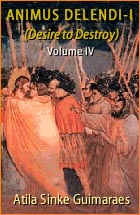 Volume IV |
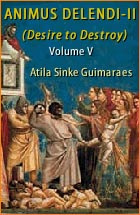 Volume V |
 Volume VI |
 Volume VII |
 Volume VIII |
 Volume IX |
 Volume X |
 Volume XI |
 Special Edition |
